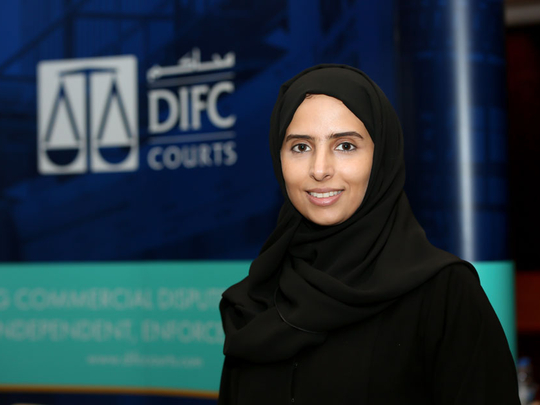
DUBAI: The DIFC courts handled enforcement claims totaling a record Dh3.4 billion last year, the authority said on Monday, an increase of a 26 per cent on 2016’s amount.
An enforcement claim is when a court, acting as a facilitator for disputes, moves a case to a final judgment, whereby it creates, for example, an order seeking one side to compensate another. This order can then be used by the parties to legally collect this compensation.
The DIFC courts handle enforcement orders stemming from judgments made by the courts themselves, both locally and internationally, and as appropriate, to enforce the judgments of other courts, upon request.
In a statement, the courts said that the enforcement figures were on the rise with increased overall value, which, they say, demonstrates the courts increased connectivity with national, regional and global courts to deal with complex transnational cases.
The vast majority of cases never reach this stage, however.
For example, 88 per cent of cases heard in the Court of First Instance (CFI) last year were settled before moving to a final judgment, increasing from 83 per cent in 2016.
The settlement rate for the Small Claims Tribunal (SCT) also rose to 85 per cent, a 10 per cent increase from 2016.
As settlements increased, so too did the number of disputes heard in the courts of the DIFC, also known as the Dubai International Financial Centre.
In a review of its key figures for 2017, the court said it had seen 520 cases in total, across all divisions, with claims at the main Court of First Instance increasing to 54, a 17 per cent rise.
They added that they had recorded a 41 per cent increase in the total number of commercial cases it handled between 2016 and 2017.
The value of Small Claims Tribunal (SCT) claims and counterclaims increased by 75 per cent in 2017, to Dh36.2 million, from Dh20.7 million in 2016.
According to Amna Al Owais, chief executive and registrar for the DIFC courts, the majority of the cases heard in the SCT, which rules on disputes below Dh500,000 in value, were related to employment matters.
“These are the default cases within the DIFC. We also have tenancy disputes, banking cases for unpaid dues, or unsettled credit card payments,” Al Owais said.
As for the Court of First Instance, which hears claims exceeding Dh500,000 in value, Al Owais said largely the cases dealt with breaches of contract, describing such claims as a typically commercial type of disputes.
“This is the area where we have the majority of our disputes. We also have some arbitration disputes in the CFI,” she added.
In a separate statement, the chief justice of the DIFC courts, Justice Michael Hwang, said the body was midway through a five-year strategy, promising to maintain the court’s rate of progress, “channelling our energy and drive for excellence into our ambition to be one of the most service-oriented and connected courts in the world.”
In terms of the court’s outlook for 2018, Al Owais would not speculate on the types of cases the court might hear, declining to say whether she thought there would be an increase in cryptocurrency-related disputes, following the boom in controversial initial coin offerings (ICO).
Hwang said in his statement that the body would continue to offer its dispute resolution services to parties around the world.












